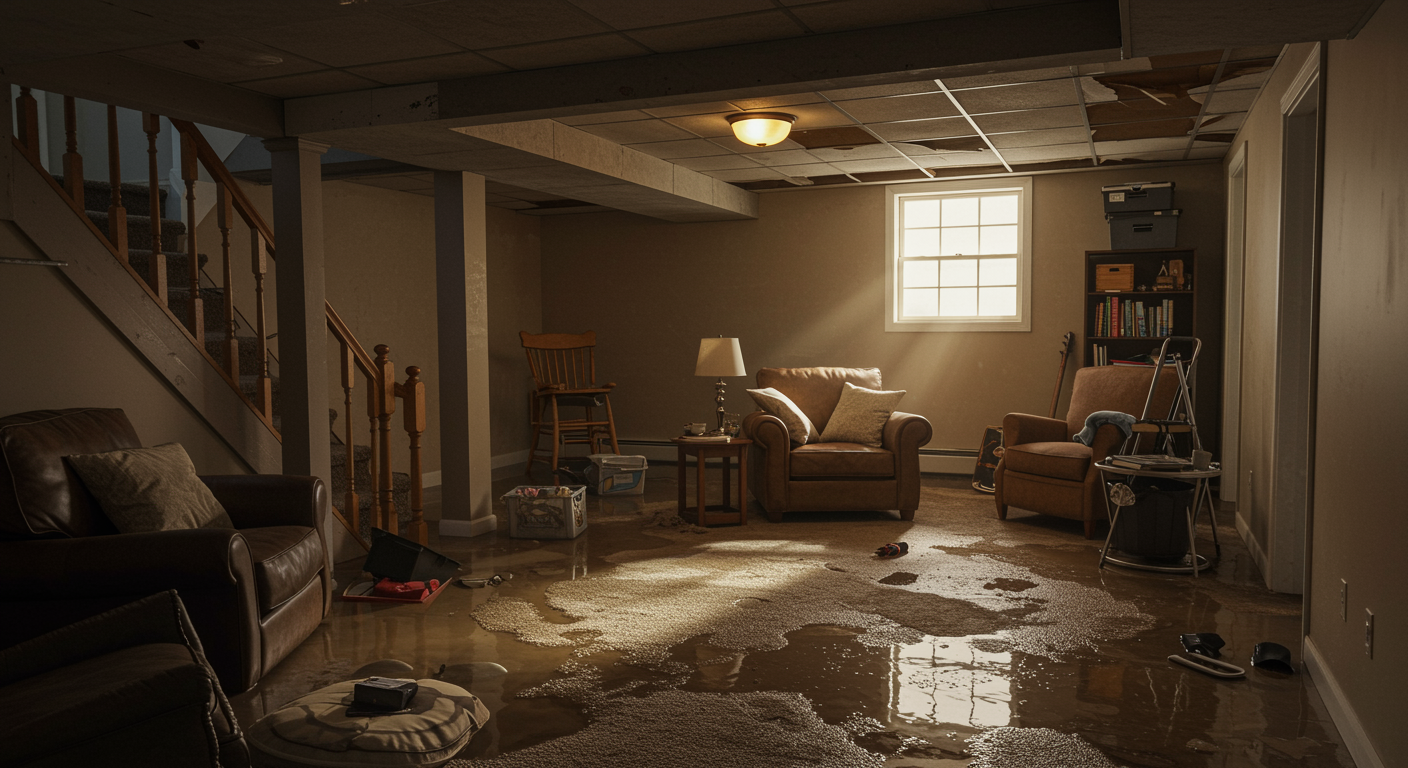Why Are Freehold Basements at Risk of Flooding?
Basements in Freehold are vulnerable to flooding for several reasons. Because they sit below ground level, they collect water more easily than other parts of the home.
Here are the most common causes of basement flooding:
- Heavy rainstorms that overwhelm the drainage system.
- Poor yard grading that directs water toward your home.
- Cracks in your foundation that allow groundwater to seep in.
- Malfunctioning or missing sump pumps.
- Clogged gutters and downspouts that cause water buildup near the foundation.
If your basement has flooded before, it’s likely to happen again. That’s why taking action now is crucial. Below, we’ll discuss five important ways to keep your basement dry.
1. Ensure Your Gutters and Downspouts Work Properly
One of the simplest ways to prevent basement flooding is maintaining your gutters and downspouts. When gutters are clogged, rainwater spills over the sides and pools near your home’s foundation. This increases the risk of water seeping into your basement.
To keep your drainage system working:
- Clean your gutters at least twice a year (spring and fall).
- Check for blockages after heavy storms.
- Extend your downspouts at least 6 feet away from your foundation.
If you don’t have time to maintain your gutters, hiring a professional can ensure water flows away from your home instead of into your basement.
2. Improve Your Home’s Grading to Direct Water Away
The way your yard slopes affects how water flows after it rains. If your yard slopes toward your home, water naturally collects near the foundation, increasing the risk of basement flooding.
Here’s how to fix grading problems:
- Check for low spots around your home’s foundation.
- Add soil to create a slight slope away from your home.
- Use landscaping to direct water toward drainage areas.
Even small grading changes can make a big difference in keeping water out of your basement. If you’re unsure whether your grading is the issue, Advanced Disaster Recovery Inc. can assess your property and recommend solutions.
3. Seal Cracks in Your Basement Walls and Floors
Water often enters basements through small cracks in the foundation. Even hairline cracks can let moisture seep in, especially during heavy rain. Over time, these cracks can grow larger, leading to serious water damage.
To seal foundation cracks:
- Inspect your basement walls and floors for any visible cracks.
- Use waterproof sealant for small cracks.
- For larger cracks, hire a professional to repair and reinforce the foundation.
Regular inspections can help catch small issues before they become costly problems. If you’re unsure where leaks are coming from, Advanced Disaster Recovery Inc. can perform a water damage inspection.
4. Install and Maintain a Sump Pump
A sump pump is one of the best defenses against basement flooding. It collects water and pumps it out before it can cause damage. However, if your sump pump isn’t working properly, it won’t protect your home.
Make sure your sump pump is:
- Installed in the lowest part of your basement.
- Tested at least twice a year to ensure it works.
- Connected to a battery backup in case of power outages.
If you don’t have a sump pump, installing one can provide peace of mind. Advanced Disaster Recovery Inc. can help with water removal, sump pump installation, and basement waterproofing solutions.
5. Use a Dehumidifier to Control Moisture
Even if your basement doesn’t flood, high humidity can still cause problems. Moisture in the air can lead to mold growth, musty odors, and damage to stored items. Using a dehumidifier helps keep humidity levels low and prevents moisture-related damage.
When choosing a dehumidifier:
- Select one rated for your basement’s size.
- Empty the water collection tank regularly or connect it to a drain.
- Run it consistently during humid months.
Keeping humidity levels below 50% can significantly reduce mold and mildew growth. If you notice musty smells or damp surfaces, Advanced Disaster Recovery Inc. can assess moisture levels and provide solutions.
What Should You Do If Your Basement in Freehold Floods?
Even with the best prevention, flooding can still happen. When it does, acting fast can reduce damage and prevent mold growth.
If your basement floods:
- Turn off electricity to the affected area if it’s safe.
- Remove standing water as quickly as possible.
- Use fans and dehumidifiers to dry out the space.
- Inspect for damage to floors, walls, and belongings.
- Call a professional restoration company for a thorough cleanup.
At Advanced Disaster Recovery Inc., we specialize in basement water removal, drying, and mold prevention. If your basement has flooded, we’re ready to help 24/7.
A flooded basement can lead to expensive repairs, mold growth, and structural issues. However, taking steps now can protect your home. By keeping gutters clean, improving grading, sealing foundation cracks, maintaining a sump pump, and controlling humidity, you can reduce your risk of water damage.
If you need basement flood cleanup or waterproofing in Freehold, Monmouth County, Advanced Disaster Recovery Inc. is here to help. Contact us for fast, reliable water damage restoration.









